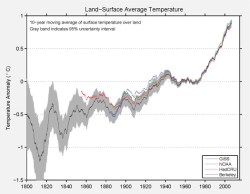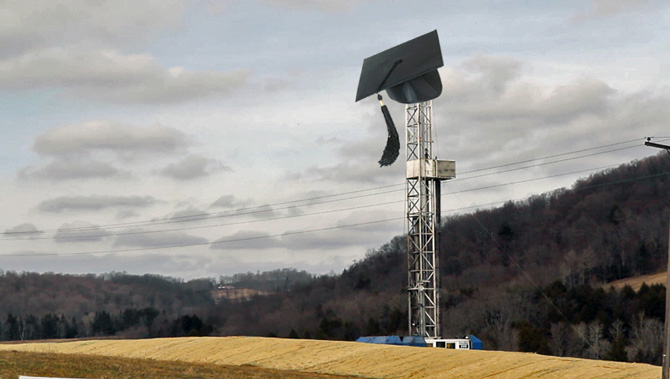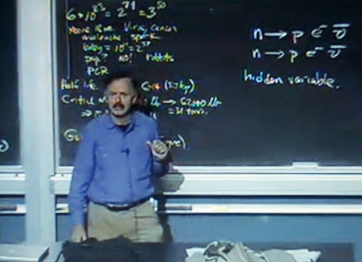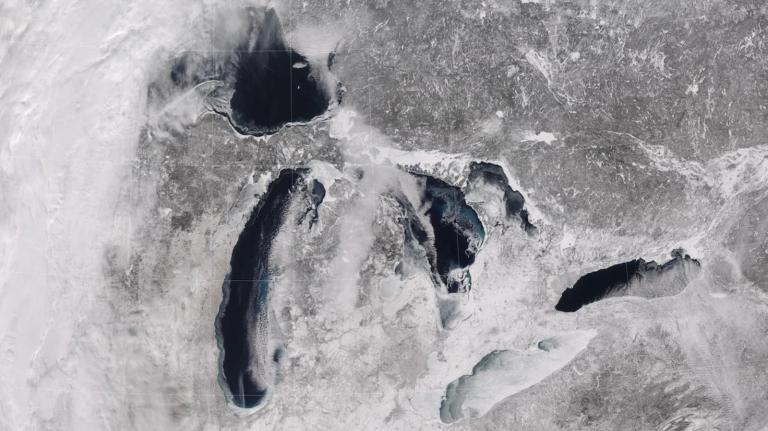
Average temperature using a 10-year moving average of surface temperatures over land. Click to embiggen. (Image courtesy of ThinkProgress.)
That giddy squeal that echoed across America this weekend was from environmentalists who’d opened up The New York Times and read an opinion piece by Richard Muller. (Well, opened the website, anyway; it wasn’t in the actual paper.) Muller, a professor at UC-Berkeley, had long argued against human-caused climate change. His piece in the Times? “The Conversion of a Climate-Change Skeptic.”
Call me a converted skeptic.
Okay, you are a converted skeptic.
Three years ago I identified problems in previous climate studies that, in my mind, threw doubt on the very existence of global warming. Last year, following an intensive research effort involving a dozen scientists, I concluded that global warming was real and that the prior estimates of the rate of warming were correct. I’m now going a step further: Humans are almost entirely the cause.
Muller argues that the results from his research are even more alarming than existing projections.
These findings are stronger than those of the Intergovernmental Panel on Climate Change, the United Nations group that defines the scientific and diplomatic consensus on global warming. …
Although the I.P.C.C. allowed for the possibility that variations in sunlight could have ended the “Little Ice Age,” a period of cooling from the 14th century to about 1850, our data argues strongly that the temperature rise of the past 250 years cannot be attributed to solar changes. …
How definite is the attribution to humans? The carbon dioxide curve gives a better match than anything else we’ve tried. Its magnitude is consistent with the calculated greenhouse effect — extra warming from trapped heat radiation. These facts don’t prove causality and they shouldn’t end skepticism, but they raise the bar: to be considered seriously, an alternative explanation must match the data at least as well as carbon dioxide does.
Responds Joe Romm of ThinkProgress: “Well, in fact, to be seriously considered, an alternative explanation must match the data at least as well as does CO2 — and it must offer some mechanism that counteracts the well-known warming effect of CO2. Not bloody likely.”
Romm, in March of last year, first broke the story that the Berkeley Earth Surface Temperature project (BEST) had confirmed warming. Romm called this latest development a “bombshell.”
The Times’ own Andy Revkin throws a little cold water on Muller, noting that the research hasn’t yet been peer-reviewed. He also asked one of Muller’s former collaborators for her take. In an email response, she explains, “I gave them my review of the paper, which was highly critical. I don’t think this new paper adds anything to our understanding of attribution of the warming.” She goes on to critique the science behind Muller’s group’s finding.
But what makes this research interesting isn’t the data; it’s the context. Muller was a climate skeptic, and BEST was funded largely by the Charles G. Koch Charitable Foundation. 
If this hadn’t been a …
![]()
… study by a …
![]()
… almost no one would pay attention, environmentalists included.
Here’s another study that got some attention over the weekend: Turns out that climate “skeptics” are also “skeptical” about things like the guilt of Lee Harvey Oswald and the moon landing.
In a survey of more than 1,000 readers of websites related to climate change, people who agreed with free market economic principles and endorsed conspiracy theories were more likely to dispute that human-caused climate change was a reality. …
What [researchers] found was remarkable. People who endorsed conspiracy theories such as “9/11 was an inside job” and “the moon landings were faked”, were also more likely to reject established scientific facts about climate change, such as “I believe that the burning of fossil fuels on the scale observed over the last 50 years has increased atmospheric temperatures to an appreciable degree.”
Remember that scene from Annie Hall?
Hide Richard Muller behind a plant in the lobby at a climate-denier convention and try to pull this trick. Have Muller explain the data himself. Think anyone will be convinced?
Point is this: In the great game of climate politics, our side scored a point. Cool! Now we’re only down by a billion.




